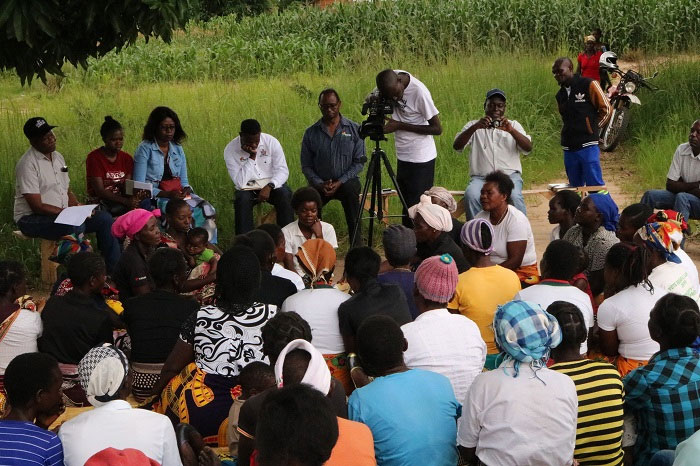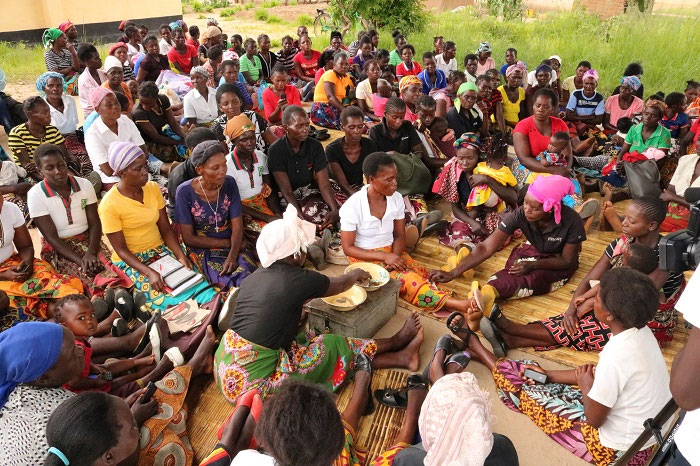Rising Fountains Development Programme (RFDP) strengthens 140 VSLAs in Lundazi District.

Rising Fountains Development Programme (RFDP) has strengthened 140 Village Savings and Loan Associations (VSLAs) in Lundazi with the support from RUFEP.
In July 2019, RFDP received a grant from RUFEP under the Community Based Financial Institutions Linkages window of the Innovation and Outreach matching grant Facility.
The grant agreement provides support for RFDP to build capacity of VSLAs in Lundazi and link them to Madison Finance.
The linkage with Madison Finance is expected to digitize linked groups which will access financial services such as savings and loans through mobile phones.
Speaking when a RUFEP Team visited VSLAs supported by RFDP in Lundazi, Project Manager Maxwell Mwenda Kakwisa said the project has strengthened 140 VSLAs and trained 18 Community Based Agents (CBAs) in readiness for the linkage with Madison Finance.
Mr. Kakwisa said the Community Based Agents (CBAs) are members of the VSLAs and were trained to support their groups on the use of mobile phones for digitized groups.
“Beyond savings and sharing, we have remobilized the 140 groups with a total membership of 3,006 in readiness for the linkage with Madison Finance. The groups are very much excited and keen to linked”, Mr. Kakwisa said.
He added that to start with, 10 groups have so far been trained by CBAs in readiness for the linkage with Madison Finance.
And speaking during a meeting with VSLAs in Kakumba area, RUFEP Programme Coordinator Michael Mbulo said RUFEP aims to promote access to sustainable financial services by poor rural men, women and youth through implementing partners such as RFDP.
The RUFEP team visited VSLAs supported by RFDP in Lundazi

The vision for financial inclusion in Zambia is to have all citizens enabled with access and usage of a wide range of affordable financial products and services that meet their needs. This will facilitate income-generating activities, build financial security, and ultimately enhance the quality and well-being of the population. Addressing financial inclusion is therefore important as a means of uplifting the livelihoods of the poor and vulnerable societies, particularly in rural areas.
Zambia has made improvements over the years in terms of financial services delivery outlets/channels offered by both the formal and informal financial institutions. Despite that, the level of adults Zambians above 18 years who are excluded from financial services remains significant. The comparison between the baseline survey 2019 and end line survey conducted in 2020 by RFDP Zambia in Lundazi, showed improvement on the number of the financially excluded adult population, The results of the survey of financial outlets in Lundazi indicates that while the urban areas are well covered in terms of financial services outlets, the rural areas have a long way to go even after taking into consideration the VSLAs and mobile money outlets such as Zanaco express, airtel, MTN and Zamtel.

According to the end line survey conducted by RFDP Zambia in Lundazi district, Eastern province of Zambia, 29% of the local population in Lundazi were financially excluded, 33% of the respondents did not have access to mobile phones which is a prerequisite for digital banking platform (RFDP Zambia End Line Report, 2020) and all these people were from the rural areas. According to the Fin Scope survey of 2020, 30.6% of the total population in Zambia was financially excluded. In rural areas, women had higher rates of financial exclusion. 66% of women were excluded from financial services compared to 59% of men. Rural areas had levels of exclusion also at 66% compared to 58% in urban areas (New Faces, New Voices, 2014).
Therefore, the major problems associated with financial exclusion are 1) lack of access and usage of financial services amongst the low-income rural women 2) Inadequate financial education and capabilities amongst low-income rural women 3) lack of linkages programs with MFIs as infrastructure to expand savings and loan products in rural areas.
It is for this reason that RFDP Zambia is currently providing interventions to tackle both the supply side and demand side bottlenecks to financial inclusion. The financial inclusion programme promotes increased financial services delivery channels and linkages between RFDP Zambia ‘s Community Based Financial Institutions in the target districts and Financial Service Providers including providing an enabling environment for the creation of Micro Finance Agent Banking model. The approach adopted by RFDP is the Village Savings and Loans Association (VSLA) model using digital banking platform. Through this model, rural women in Solwezi, Lumezi, Lundazi, Mambwe, Mushindamo and Kalumbila districts are able to develop their own structures to facilitate digital savings and lending and improve access to financial services and increase incomes, where the savings in turn are accessed as loans by affected savers through digital banking platform.
In order to promote Financial Inclusion, RFDP is implementing the following interventions.
(1) increasing access and usage of financial services for low-income rural women through formation and strengthening of Village Savings Loans Associations (VSLAs) and providing financial support to start micro and small-scale enterprises
(2) Provide Capacity development to women and men to improve financial capabilities of SMEs through financial literacy, business skills training, savings mobilization, credit management training
(3) Promote the culture of Savings amongst the VSLA members to increase savings and income generated from annual dividends and sales from enterprises within VSLAs
(4) Create linkages with Financial Service Providers to further expand their savings and loan products using digital banking platform.
(5) Increase Access to Insurance products for the disadvantaged and vulnerable populations.